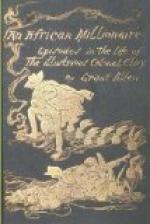“Hawkins was made an earl,” said Charles, speaking of some London acquaintance.
“What for?” asked the Senator.
“Successful adulteration,” said the poet tartly.
“Honours are easy,” the magazine editor put in.
“And two by tricks to Sir Charles,” the poet added.
Towards the close of the evening, however—the poet still remaining moody, not to say positively grumpy—Senator Wrengold proposed a friendly game of Swedish poker. It was the latest fashionable variant in Western society on the old gambling round, and few of us knew it, save the omniscient poet and the magazine editor. It turned out afterwards that Wrengold proposed that particular game because he had heard Coleyard observe at the Lotus Club the same afternoon that it was a favourite amusement of his. Now, however, for a while he objected to playing. He was a poor man, he said, and the rest were all rich; why should he throw away the value of a dozen golden sonnets just to add one more pinnacle to the gilded roofs of a millionaire’s palace? Besides, he was half-way through with an ode he was inditing to Republican simplicity. The pristine austerity of a democratic senatorial cottage had naturally inspired him with memories of Dentatus, the Fabii, Camillus. But Wrengold, dimly aware he was being made fun of somehow, insisted that the poet must take a hand with the financiers. “You can pass, you know,” he said, “as often as you like; and you can stake low, or go it blind, according as you’re inclined to. It’s a democratic game; every man decides for himself how high he will play, except the banker; and you needn’t take bank unless you want it.”
“Oh, if you insist upon it,” Coleyard drawled out, with languid reluctance, “I’ll play, of course. I won’t spoil your evening. But remember, I’m a poet; I have strange inspirations.”
The cards were “squeezers”—that is to say, had the suit and the number of pips in each printed small in the corner, as well as over the face, for ease of reference. We played low at first. The poet seldom staked; and when he did—a few pounds—he lost, with singular persistence. He wanted to play for doubloons or sequins, and could with difficulty be induced to condescend to dollars. Charles looked across at him at last; the stakes by that time were fast rising higher, and we played for ready money. Notes lay thick on the green cloth. “Well,” he murmured provokingly, “how about your inspiration? Has Apollo deserted you?”
It was an unwonted flight of classical allusion for Charles, and I confess it astonished me. (I discovered afterwards he had cribbed it from a review in that evening’s Critic.) But the poet smiled.
“No,” he answered calmly, “I am waiting for one now. When it comes, you may be sure you shall have the benefit of it.”
Next round, Charles dealing and banking, the poet staked on his card, unseen as usual. He staked like a gentleman. To our immense astonishment he pulled out a roll of notes, and remarked, in a quiet tone, “I have an inspiration now. Half-hearted will do. I go five thousand.” That was dollars, of course; but it amounted to a thousand pounds in English money—high play for an author.




